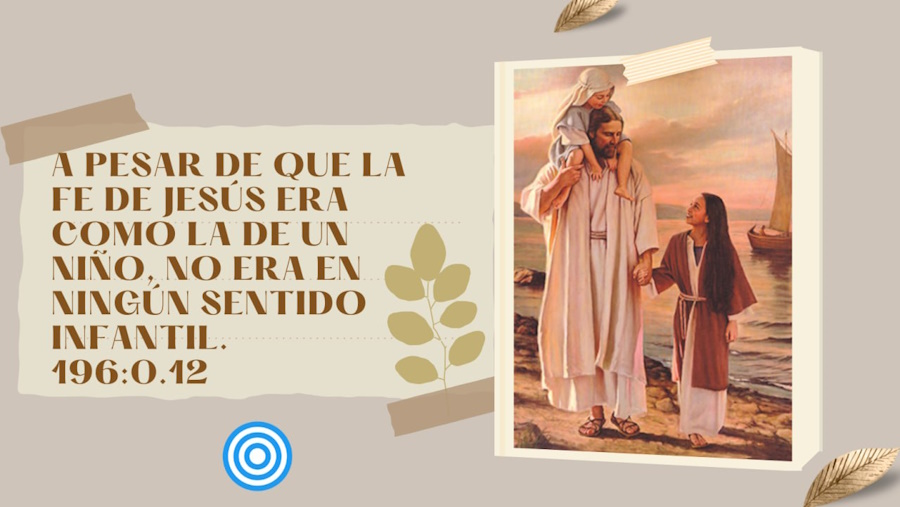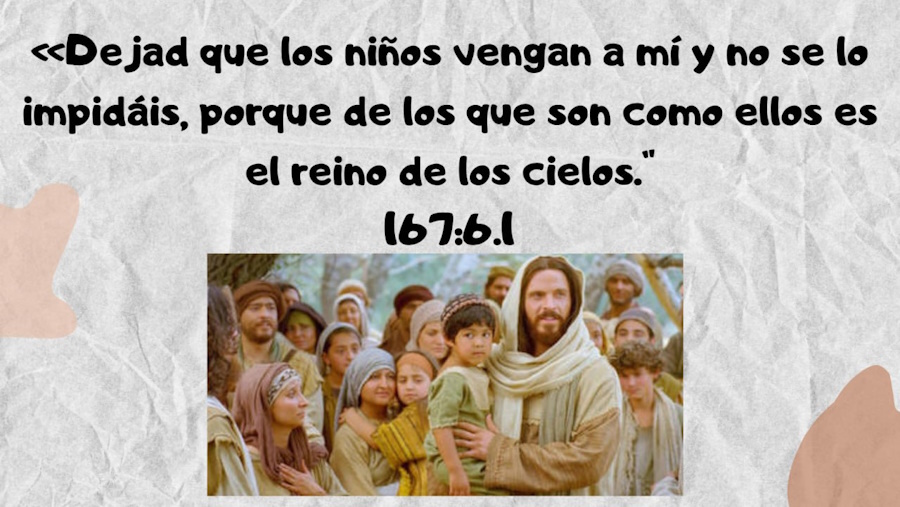© 2023 María José Sánchez Santamaría
© 2023 Urantia Association of Spain
| Luz y Vida — March 2023 — Newsletter | Luz y Vida — March 2023 — Index | Urantia Reflections: Awakening to a New Consciousness (Part Two) |

¶ Be like children
A new month begins, and with it spring appears to us once again, splendid in its energy and renewal (at least in the hemisphere in which we find ourselves). A new month and a new issue of our monthly newsletter, with which we want to start releasing seeds in a somewhat more conscious way of seeing and acting, always inspired by the blue book, but also seeking to find real pearls wherever they appear to us.
Do you dare to reflect on different aspects that The Urantia Book shows us and that allows us to expand our cosmic consciousness, allows us to elevate our spiritual perception? Those are the objectives of The Urantia Book (as we read about them in the Prologue) and, saving the distance, also ours.
Dear readers, if these are also your objectives, we encourage you to continue reading our March 2023 issue. We offer you our hand, take it and come with us to continue exploring, imagining, growing… in an endless adventure.

. . .Jesus, hearing the tumult, came out and indignantly reproved them, saying: “Suffer little children to come to me; forbid them not, for of such is the kingdom of heaven. Verily, verily, I say to you, whosoever receives not the kingdom of God as a little child shall hardly enter therein to grow up to the full stature of spiritual manhood.” UB 167:6.1
And so does the sacred oftentimes appear to be the common, as on this day these children and their mothers little realized that the onlooking intelligences of Nebadon beheld the children of Jericho playing with the Creator of a universe. UB 167:6.3
Boys and girls lacked any type of social consideration at the time when Jesus of Nazareth lived. Therefore, it is not surprising that the disciples scolded them when they made a fuss near the teacher. To everyone’s surprise, however, Jesus exalts them and makes it clear that smallness, simplicity, is the ultimate criterion of the kingdom.
. . .the Master said: “I want to set men free so that they can start out afresh as little children upon the new and better life.” (UB 140:8.26)
Furthermore, Jesus comes to identify with them:
In this giant intellect of the full-grown man the faith of the child reigned supreme in all matters relating to the religious consciousness. It is not strange that he once said, “Except you become as a little child, you shall not enter the kingdom.” Notwithstanding that Jesus’ faith was childlike, it was in no sense childish. (UB 196:0.12)
We even read this statement that should make us reflect:
““It would appear that the Father in heaven has hidden some of these truths from the wise and haughty, while he has revealed them to babes… . .”” (UB 144:8.8)
How surprising it is to see that one of the conditions for following Jesus, something that he reiterated a lot to his disciples then (and to those now, of course) is “to be like children.” A religious Master from more than 2000 years ago has that curious and strange idea for what was in style then, and we can ask ourselves: why does he use children as a model?
We can enumerate some keys that can make us understand a little about this emphasis of the Master on “being like children.”
- Girls and boys ARE
They limit themselves to breathing, moving, sleeping, putting things in their mouths… They do the most basic and elementary, which is also the most essential. This is very important: we should not think, feel, talk, work (things that adults do) without first having slept, breathed, walked, etc. They are immersed in the world (they are body before mind), which allows them to cry freely. Crying is often the most natural response to reality. They are immersed in the world, which fosters the experience of unity that every spiritual seeker aspires to.
- Her mind is VIRGIN
As their minds are emptier than that of the elderly, they can go through life without prejudice, simply accept what is presented to them and adapt to the environment. They know that things are the way they are and that is why they do not respond to stimuli with their heads (like the older ones) but with their bodies: they jump, laugh, cry, shout, etc. Moving a lot is necessary to know how to stay still later. The stillness of meditative practice and prayer is today a great challenge, since not all of us have integrated physical exercise into our daily lives.
- They have ENTHUSIASM
The enthusiastic attitude of the little ones is what Jesus blesses and encourages them to imitate. The ability to get excited is lost because our attention is diminished and our attachments are increased. Enthusiasm is being lit from within: enjoying that vital, powerful and unquestionable energy that any boy or girl has.
- Enjoy the GAME
Spirituality often takes on a solemnity that does not really belong to it. True spirituality begins with relaxation, and in this children prove to be infinitely more spiritual than adults, whom we often find tense and worried. In fact, few adults get really good sleep: eight hours straight, without interruption. Excessive seriousness, that is, lack of relaxation, is a serious impediment to indoor cultivation.
This irrelevant seriousness, this paralyzing gravity, should only come from the great importance we give ourselves. Many spiritual people are (are) usually too obsessed with ourselves and our path. The smallest lack this scourge. They trust in their intuition, in the immediate vision of things. Proof of this is that they know how to play, that is, stay active without the desire for performance, just to enjoy. How few adults regularly spend time playing! We are not talking about having fun with a machine, but about getting our hands dirty, interacting with others, getting the best out of ourselves without expecting a result. We adults don’t play because we don’t have time, that’s what we say. And if we play it’s to kill time, we say that too. But in the real game, on the other hand, the sensation of time disappears: we approach the eternal.
But the ultimate reason why we adults don’t play is because of the fear of making a fool of ourselves and failing. Whoever thinks of life in terms of success or failure is giving himself too much importance, but the spiritual path cannot be followed without failing over and over again, as many as necessary. We have to fail until we realize that it doesn’t matter.
Precisely, in The Urantia Book we observe that Jesus played with some frequency with the little ones, without complexes and enjoying himself. Something that those of us who claim to be his followers can take note of:
The banquet went along in a very cheerful and normal manner except that all the apostles were unusually sober. Jesus was exceptionally cheerful and had been playing with the children up to the time of coming to the table. (UB 172:1.4)
- Laughter
Knowing how to laugh, laugh, is something rare among the elderly: it means letting go of the body, abandoning oneself, forgetting one’s own image. Laughing is a very beautiful and effective way of merging with what is there, of participating in the party of life. But the laughter of adults is rarely fresh and spontaneous, it tends to be rather sarcastic or vicious, often artificial or ironic; that is, intellectual. Boys and girls laugh easily, there is not a day that a child does not laugh. Not laughing is a serious difficulty for someone who aspires to spiritual growth.
In The Urantia Book we note that the Master was known for his great sense of humor:
It was always difficult for Jesus to comprehend the harm of certain sorts of play which were forbidden on the Sabbath, but he never failed to conform to his parents’ wishes. He had a capacity for humor and play which was afforded little opportunity for expression in the environment of his day and generation, . . … (UB 123:4.3)
He often used humor as a way to relieve tension and promote relaxation and harmony among his peers:
They were all seated in the garden at just about noon when the Master appeared. They wore expressions of dignified solemnity, and all arose to their feet as he approached them. Jesus relieved the tension by that friendly and fraternal smile which was so characteristic of him when his followers took themselves, or some happening related to themselves, too seriously. (UB 157:4.3)

We also discover, to our surprise, that there are celestial beings like angels of fun who take an interest in our mood and work to improve it:
The angels of diversion. These are the seraphim who foster the values of play, humor, and rest. They ever seek to uplift man’s recreational diversions and thus to promote the more profitable utilization of human leisure. (UB 114:6.15)
This small reflection on this facet of the gospel makes us see how important it is not to prevent your boy or girl from approaching you when you meditate or pray. Put it in the center, as Jesus himself did with the boys and girls who approached him so many times.
That lightness, confidence, good humor, desire to play and learn, receptivity… that the little ones possess, Jesus admired them then and he must admire us too.
When he had entered the garden, he gathered the apostles around him and taught them further, saying: “You find it difficult to receive my message because you would build the new teaching directly upon the old, but I declare that you must be reborn. You must start out afresh as little children and be willing to trust my teaching and believe in God.” (UB 140:6.2)
Let’s look at the fragility of boys and girls to realize that we all have inside, to a greater or lesser depth, the boy or girl we were one day. But it is not about being that girl or boy that we were once again, but about being after leaving that stage of life behind. «The spiritual life does not invite childish naivety, but a conscious one. Not to an ignorant candor, but wise. It invites you to innocence from experience," says the priest Pablo d’Ors.
And what does that consist of? In seeing the good in the world and remaining as long as possible in that gaze. On working with the layout of the game. In listening without losing the amazement. In returning to the body, which is essential. In contact with nature and animals.

The little ones are our teachers when it comes to finding balance in life:
Worship—contemplation of the spiritual—must alternate with service, contact with material reality. Work should alternate with play; religion should be balanced by humor. (UB 143:7.3)
Our dear Master loved and respected the boys and girls, he took them into account in his life and his message. Even in the final messages he didn’t forget about them:
“This gospel of the kingdom belongs to both Jew and gentile, to rich and poor, to free and bond, to male and female, even to the little children. And you are all to proclaim this gospel of love and truth by the lives which you live in the flesh. (UB 191:6.2)
This is how disconcerting, anti-system, amazing our God is: a God who makes himself small and lives with us on Earth, and who also advises us not to disconnect from the little ones in our spiritual growth. Will we follow Jesus, also in his love for the little ones? In his confidence towards God, like a child towards his mother or father? That can be our decision and the beginning of a wonderful adventure that will never end.
¶ References
| Luz y Vida — March 2023 — Newsletter | Luz y Vida — March 2023 — Index | Urantia Reflections: Awakening to a New Consciousness (Part Two) |